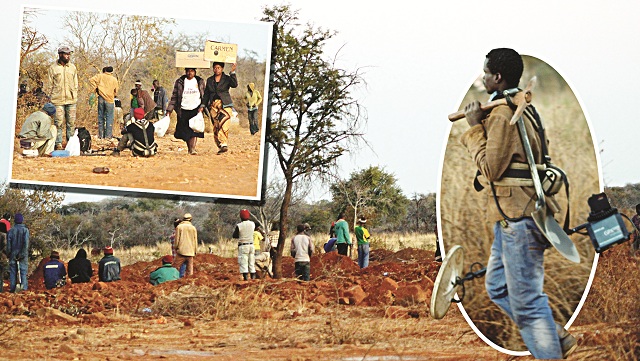Miners’ mercury use major health concern


Small scale miners at work in Inyathi in this file photo. There is need to train small-scale miners in the proper use and storage of mercury
Gibson Mhaka
ALTHOUGH artisanal and small-scale gold mining is an important livelihood strategy in developing countries like Zimbabwe it is, however, associated with many negative impact on social, environmental and health which present particular sustainable development challenges.
Of all the challenges perpetrated and faced by artisanal and small-scale gold miners in the country, ranging from lack of formalisation and regulation, failure to secure loans from banks and other financial institutions for their starting capital, mercury use undoubtedly represents a major environmental and human health concern.
While mercury use in small-scale gold mining is “illegal”, miners still use it to extract gold, thereby exposing both the environment and humans to health risks.
According to the World Health Organisation (WHO), artisanal miners who use mercury to extract gold from soil dug in the mines risk developing a range of health complications.
The world health body says mercury, which is toxic even at low concentration, is one of the top 10 chemicals of major public health concern and the complications include permanent damage to the nervous system, in particular the developing nervous system.
And yet to most artisanal and small-scale gold miners in Zimbabwe and beyond, mercury is one of the vital possessions every miner wishes to have. The liquid chemical is highly sought after as they apply it during the process to extract gold from soil dug in the mines.
Mr Simon Ncube, a gold miner from Inyathi District in Matabeleland North Province explained that they use mercury to help separate and collect the bits of gold after it has been sieved from a mixture of soil and water.
He, however, said he was not aware of its dangers, which health experts say develop gradually.
“I often have a headache, and at times feel weak with a bitter taste in my mouth. Since I have been working with mercury for many years, I suspect that these are symptoms of mercury poisoning,” said Mr Ncube.
While local miners need mercury to help them get gold, they are also inviting ill health that could cause death with the same measure.
According to a recent report, a number of artisanal miners across the country are exposing themselves and their family members to mercury poisoning through inhaling vapour and smoke during gold processing.
During gold processing, mercury is mixed with gold-containing materials, forming a mercury-gold amalgam which is then heated, vaporising the mercury to obtain the gold.
After crushing of gold ore, mercury is added to isolate it from other metals. This is done by burning the combination using a smouldering log so that the mercury, together with other impurities, is burnt, leaving behind the gold because of its incombustible nature.
This process is very dangerous and leads to significant mercury exposure and health risks since the mercury and impurities which turn into vapour and smoke, is released into the atmosphere and inhaled at the source.
Artisanal and small-scale gold miners out to extract as much gold as possible and make quick profits have over the years resorted to using mercury in extracting the precious mineral and, in the process, have exposed both the environment and humans to health risks.
The report further says at times, the panners swallow gold nuggets laced with mercury to evade the police adding that most of the panners prefer handling the mercury without protective clothing for fear of losing some gold particles.
Mercury poisoning, medical experts say, occurs through inhaling or coming into contact with vapour and ingestion, which can lead to headaches, loss of coordination, visual impairment and reduced ability to think, among other symptoms.
A medical expert, Dr Wenceslas Nyamayaro, said due to limited information on the dangers of mercury and poor health consciousness by artisanal miners, most would die without knowing the cause.
He said high exposure to mercury can also lead to respiratory complications, kidney malfunction and death adding that some of the symptoms of mercury poisoning include mood swings, irritability and nervousness.
More so, waste discharges from mercury use have also created an environmental problem in that the water used in the extraction process is deposited into the rivers, significantly increasing the amount of chemical contamination.
Since mercury contamination associated with artisanal and small-scale gold mining and processing represents a major environmental and human health concern in Zimbabwe, there is need for investment in awareness programmes to protect both the environment and artisanal miners.
According to the United Nations Environment Programme (UNEP), artisanal and small-scale gold mining is the world’s second greatest source of atmospheric mercury pollution after coal combustion.
Hence, awareness, on mercury as a serious health hazard, is the key to required urgent actions, and needs to be increased at all levels, from national policymakers, regional stakeholders, to health experts and the population in mining areas.
Zimbabwe Miners’ Federation chief executive officer Mr Wellington Takavarasha said there was need to train artisanal and small-scale miners on proper storage and use of mercury.
“We are working with the Environmental Management Agency, (EMA), Ministry of Mines and Mining Development and other stakeholders in the environment and mining sectors to design an action plan on simple and effective alternative practices that can be implemented immediately to substantially reduce mercury use and exposure.
“As the Zimbabwe Miners’ Federation, we are also rolling out programmes sensitising artisanal and small-scale miners on the dangers of using mercury not only on their health but on the ecosystem too. We also want to identify ways to overcome these challenges through information investment and institutions that prevent small-scale mining from realising its potential to contribute to sustainable development,” said Mr Takavarasha.
From Mr Takavarasha’s explanation, it is clear that the government should strengthen the education of artisanal and small-scale miners on the proper use and storage of substances like mercury in extracting gold.
The government should also speed up the legalisation of artisanal mining which is mostly done illegally so their activities could be monitored and controlled.
Mr Takavarasha said Zimbabwe, being one of the first countries to sign the Minamata Convention on Mercury, should facilitate the elimination of mercury-intensive practices, and the adoption of low mercury and mercury-free alternatives, to substantially reduce mercury use and exposure.
The Minamata Convention on Mercury is a global agreement for reducing mercury pollution which was signed in October 2013 in Japan, to recognise the risks of using mercury in artisanal and small-scale gold mining, and calls upon nations to reduce, and where feasible eliminate mercury use in this sector.
Article 3 of the Minamata Convention on mercury supply sources and trade states that the chemical’s export and import shall be through consent from the receiving party.
It reads: “Each party shall not allow the export of mercury except to a party that has provided the exporting party with written consent and only for the purposes of, and to, a use allowed to all parties under this Convention.”
Also, part of the agreement is to formulate strategies for public health, manage trade of mercury, engage stakeholders in the development and implementation of the national action plan, and prevent the exposure of vulnerable populations such as children and women.
Environment experts believe it possible for artisanal and small-scale gold miners to safely and economically recover gold without using mercury.
They say many artisanal and small-scale miners can achieve high rates of gold recovery without mercury, benefiting their health, the health of their communities, and the environment.
Deputy Director in the Ministry of Environment and Natural Resources Management Mr Abu Matiza said mercury contamination associated with small scale gold mining and processing represents a major environmental and human health concern.
“A very important factor in the impacts of mercury to the environment is its ability to build up in organisms and up along the food chain. When products and wastes containing mercury are improperly disposed, mercury is released into the air, ground or water and affects species like fish which are the main source of food for many people, birds and other animals.
“Eating mercury-contaminated food is the primary route of exposure to mercury for most people. Mercury can damage human health because it is toxic to the nervous system particularly the developing nervous system of a foetus. Damage occurring before birth or in infancy can cause a child to be late in beginning to walk and talk and may cause lifelong learning problems,” observed Mr Matiza.
He said there were simple and effective alternative practices that can be implemented immediately by artisanal and small-scale gold miners to substantially reduce mercury use and exposure.
“These include eliminating the worst practices, where mercury is either unnecessary or wasted, such as whole ore amalgamation, open burning amalgamation without the use of retort or other mercury vapour capture systems and the use of cyanide after mercury amalgamation, or in-processing in mercury-rich tailings without first removing mercury,” said Mr Matiza.
He said there was also need by the government to facilitate the elimination of mercury-intensive practices and restrictions on mercury supply as well as the adoption of low mercury and mercury-free alternatives by artisanal miners.










Comments